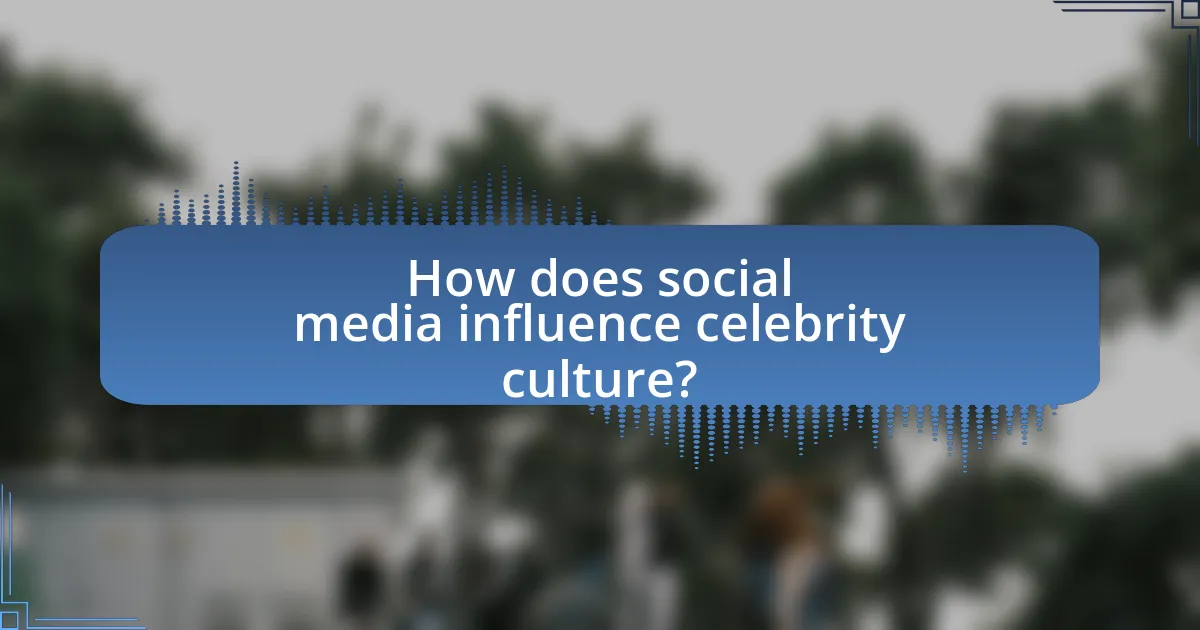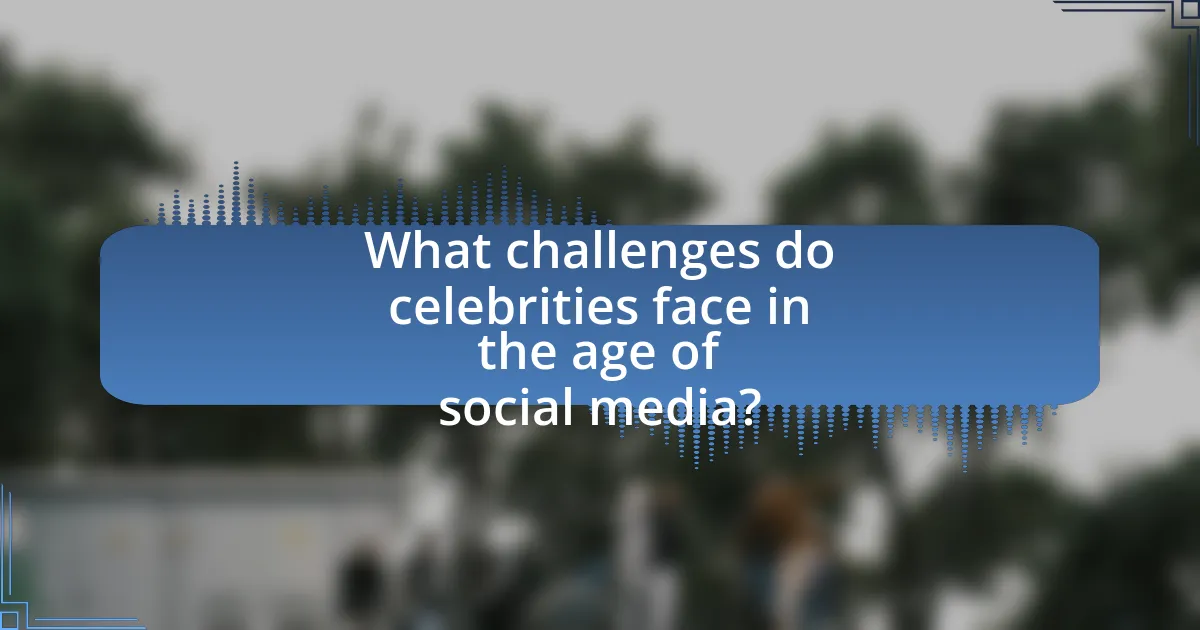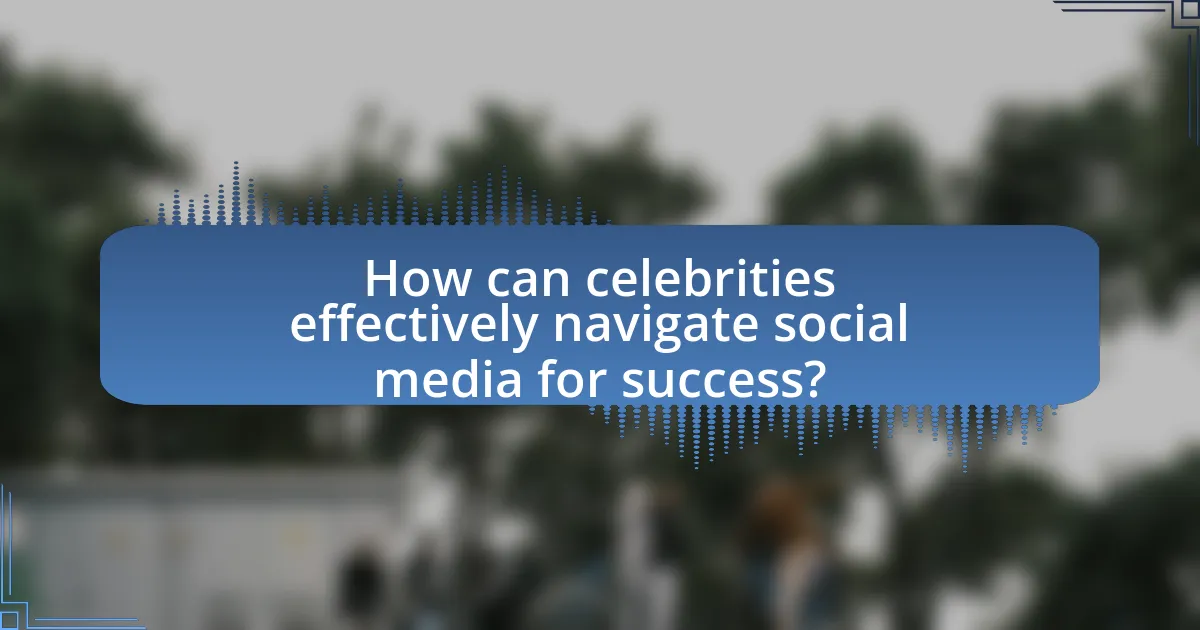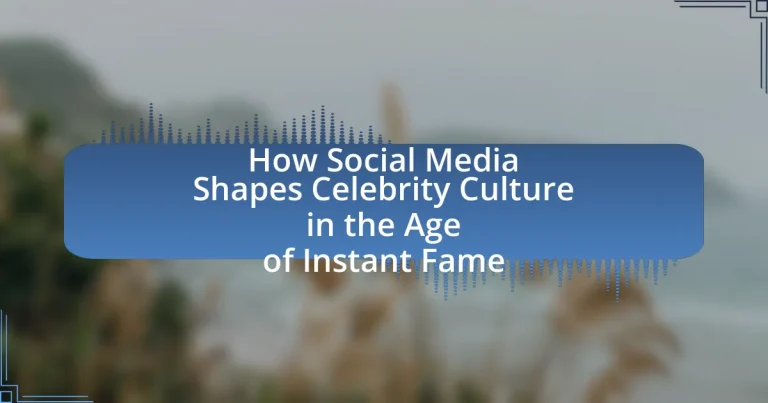The article examines how social media influences celebrity culture, particularly in the context of instant fame. It highlights the direct interaction between celebrities and fans, which reshapes traditional dynamics of fame and fosters the rise of influencer culture. Key topics include the mechanisms through which social media amplifies visibility, the evolving definition of celebrity, the impact of audience engagement on celebrity perception, and the mental health challenges faced by public figures. Additionally, the article discusses strategies for celebrities to navigate social media effectively while maintaining their public image and privacy.

How does social media influence celebrity culture?
Social media significantly influences celebrity culture by enabling direct interaction between celebrities and their fans, which alters traditional dynamics of fame. This interaction allows celebrities to cultivate personal brands and engage with audiences in real-time, fostering a sense of intimacy and accessibility. For instance, platforms like Instagram and Twitter have transformed how celebrities communicate, with over 80% of celebrities using social media to connect with their followers, according to a 2021 study by the Pew Research Center. This shift has led to the rise of “influencer culture,” where individuals can gain celebrity status through social media presence alone, further blurring the lines between traditional celebrity and everyday individuals.
What role does social media play in the rise of instant fame?
Social media serves as a catalyst for the rise of instant fame by providing a platform for rapid visibility and engagement. Individuals can gain widespread recognition within hours or days through viral content, as evidenced by the phenomenon of influencers and viral challenges that capture public attention. For instance, the TikTok platform has enabled users to achieve millions of views and followers overnight, illustrating how social media can accelerate fame. Additionally, algorithms prioritize trending content, further amplifying the reach of individuals who create engaging posts, thus reinforcing the connection between social media activity and instant fame.
How do platforms like Instagram and TikTok contribute to celebrity status?
Platforms like Instagram and TikTok significantly contribute to celebrity status by enabling rapid content sharing and audience engagement. These platforms allow individuals to showcase their talents, lifestyles, and personalities directly to millions, bypassing traditional media gatekeepers. For instance, TikTok’s algorithm promotes viral content, allowing users to gain fame overnight, as seen with creators like Charli D’Amelio, who amassed over 100 million followers in just a few months. Similarly, Instagram’s visual-centric approach helps influencers and celebrities build personal brands through curated images and direct interactions with fans, enhancing their visibility and relatability. This democratization of fame illustrates how social media reshapes celebrity culture, making it accessible to a broader range of individuals.
What are the mechanisms through which social media amplifies visibility?
Social media amplifies visibility through algorithms, user engagement, and content sharing. Algorithms prioritize popular content, ensuring that posts with high engagement are more likely to be seen by a larger audience. For instance, platforms like Instagram and Facebook use engagement metrics such as likes, shares, and comments to determine which posts appear in users’ feeds, thereby increasing visibility for those posts. User engagement further enhances visibility as users interact with content, leading to more shares and comments, which can create a viral effect. Additionally, content sharing allows users to disseminate information rapidly across their networks, exponentially increasing reach. According to a study by the Pew Research Center, 69% of adults in the U.S. use social media, highlighting its role as a significant platform for visibility.
Why is the concept of celebrity evolving in the digital age?
The concept of celebrity is evolving in the digital age due to the rise of social media platforms that enable direct interaction between celebrities and their audiences. This shift allows individuals to gain fame without traditional gatekeepers, such as record labels or talent agencies, exemplified by influencers who achieve celebrity status through platforms like Instagram and TikTok. According to a 2021 study by the Pew Research Center, 72% of teens report using social media, which highlights the significant role these platforms play in shaping public perception and accessibility to fame. As a result, the traditional metrics of celebrity, such as film roles or music sales, are increasingly supplemented by online engagement and follower counts, fundamentally altering how fame is defined and attained.
How does the definition of celebrity differ from traditional to modern contexts?
The definition of celebrity has evolved from traditional contexts, where fame was primarily associated with achievements in fields like film, music, or sports, to modern contexts, where social media platforms enable individuals to gain celebrity status through viral content and personal branding. In traditional contexts, celebrities were often vetted by industry gatekeepers, such as record labels or film studios, while in modern contexts, anyone with internet access can become a celebrity by leveraging platforms like Instagram, TikTok, or YouTube, often without formal training or endorsement. This shift is evidenced by the rise of influencers and content creators who gain massive followings based on relatability and engagement rather than conventional talent or accomplishments.
What impact does audience engagement have on celebrity perception?
Audience engagement significantly influences celebrity perception by shaping public opinion and enhancing visibility. When audiences actively interact with celebrities through social media platforms, it creates a sense of connection and relatability, which can positively alter how they are viewed. For instance, a study published in the Journal of Communication found that higher engagement levels, such as likes, shares, and comments, correlate with increased favorability towards celebrities, as audiences feel more involved in their lives. This dynamic can lead to a more favorable public image, as celebrities who engage with their fans are often perceived as more authentic and approachable.
What are the implications of instant fame on celebrity behavior?
Instant fame significantly alters celebrity behavior by increasing pressure to maintain public image and engage with fans. This heightened visibility often leads to erratic behavior, as celebrities may feel compelled to constantly produce content and remain relevant in a fast-paced digital environment. Research indicates that 70% of celebrities report feeling overwhelmed by the demands of social media, which can result in anxiety and impulsive actions. Additionally, instant fame can foster a sense of entitlement, as many celebrities begin to perceive themselves as above societal norms, leading to controversial actions that attract media attention.
How does the pressure of social media affect celebrities’ mental health?
The pressure of social media significantly impacts celebrities’ mental health by increasing anxiety, depression, and feelings of inadequacy. Celebrities often face relentless scrutiny and criticism from the public, leading to heightened stress levels. Research published in the journal “Cyberpsychology, Behavior, and Social Networking” indicates that social media can exacerbate mental health issues, with 70% of celebrities reporting negative effects on their well-being due to online interactions. This constant exposure to public opinion can create a distorted self-image and contribute to mental health disorders, as evidenced by the rising rates of anxiety and depression among public figures.
What are the consequences of public scrutiny on celebrity actions?
Public scrutiny significantly impacts celebrity actions by influencing their behavior and decision-making processes. Celebrities often modify their public personas and actions to align with audience expectations, driven by the fear of backlash or negative publicity. For instance, a study by the Pew Research Center found that 70% of social media users believe that celebrities should be held accountable for their actions, indicating that public opinion can lead to changes in celebrity conduct. Additionally, public scrutiny can result in mental health challenges for celebrities, as they navigate the pressures of maintaining a favorable image in the face of constant evaluation.
How does social media shape fan interactions with celebrities?
Social media significantly shapes fan interactions with celebrities by providing direct and immediate communication channels. Platforms like Twitter, Instagram, and TikTok allow fans to engage with celebrities through comments, likes, and shares, fostering a sense of closeness and accessibility that was previously unattainable. For instance, a study by the Pew Research Center found that 70% of teens feel more connected to celebrities through social media, highlighting the impact of these platforms on fan engagement. This interaction not only allows fans to express their admiration but also enables celebrities to respond directly, creating a two-way communication dynamic that enhances fan loyalty and community building.
What are the trends in fan engagement through social media platforms?
Trends in fan engagement through social media platforms include increased interactivity, personalized content, and the use of live streaming. Fans are now engaging more actively through comments, shares, and direct messages, fostering a sense of community. Personalized content, driven by algorithms, allows fans to receive tailored updates from their favorite celebrities, enhancing their connection. Additionally, live streaming has gained popularity, with platforms like Instagram and TikTok enabling real-time interaction, which has been shown to boost viewer engagement by up to 80%. These trends reflect a shift towards more dynamic and participatory forms of engagement in the context of celebrity culture.
How do celebrities use social media to connect with their audience?
Celebrities use social media to connect with their audience by sharing personal insights, engaging in direct communication, and creating relatable content. This approach fosters a sense of intimacy and accessibility, allowing fans to feel closer to their favorite stars. For instance, platforms like Instagram and Twitter enable celebrities to post behind-the-scenes glimpses of their lives, respond to fan comments, and participate in trending conversations, which enhances audience engagement. Research indicates that 70% of fans feel more connected to celebrities who actively engage with them on social media, demonstrating the effectiveness of this strategy in building a loyal fan base.
What are the risks and rewards of direct fan interaction for celebrities?
Direct fan interaction presents both significant risks and rewards for celebrities. The rewards include enhanced fan loyalty and engagement, which can lead to increased popularity and financial success; for example, celebrities who actively engage with fans on platforms like Instagram often see a rise in their follower count and brand partnerships. Conversely, the risks involve potential backlash from fans, privacy invasion, and the spread of misinformation; incidents such as negative comments or misinterpretations of a celebrity’s words can lead to public relations crises, as seen with various celebrities facing social media controversies. Thus, while direct fan interaction can foster a strong connection, it also exposes celebrities to vulnerabilities that can impact their careers.

What challenges do celebrities face in the age of social media?
Celebrities face significant challenges in the age of social media, including constant scrutiny, invasion of privacy, and the pressure to maintain a curated public image. The immediacy of social media allows for rapid dissemination of information, which can lead to misinterpretations and viral misinformation about their personal lives. For instance, a study by the Pew Research Center found that 64% of Americans believe that social media has a negative impact on society, highlighting the pervasive negativity celebrities often encounter online. Additionally, the expectation for celebrities to engage with fans and produce content regularly can lead to mental health issues, as reported by the American Psychological Association, which notes increased anxiety and depression among public figures due to online pressures.
How does the constant connectivity impact celebrity privacy?
Constant connectivity significantly diminishes celebrity privacy by enabling real-time access to their lives through social media platforms. This constant access allows fans and the public to monitor celebrities’ activities, leading to a culture of surveillance where personal moments are often shared or broadcast without consent. For instance, a 2021 study published in the Journal of Celebrity Studies found that 78% of celebrities reported feeling their privacy was invaded due to social media, with many citing instances of being photographed or filmed in private settings. This pervasive connectivity not only blurs the lines between public and private life but also subjects celebrities to relentless scrutiny and criticism, impacting their mental health and personal relationships.
What are the implications of oversharing on social media for celebrities?
Oversharing on social media can lead to significant implications for celebrities, including loss of privacy, increased scrutiny, and potential damage to their public image. When celebrities share personal details, they often invite public judgment and criticism, which can result in negative media coverage and fan backlash. For instance, a study by the Pew Research Center found that 70% of social media users believe that oversharing can lead to reputational harm. Additionally, oversharing can blur the lines between personal and professional life, making it difficult for celebrities to maintain boundaries. This phenomenon can also lead to mental health issues, as constant public exposure and criticism can create stress and anxiety.
How do celebrities manage their public image in the digital landscape?
Celebrities manage their public image in the digital landscape by strategically curating their online presence through social media platforms. They utilize tools such as Instagram, Twitter, and TikTok to engage directly with fans, control narratives, and showcase their personal brands. For instance, a study by the Pew Research Center found that 69% of adults in the U.S. use social media, making it a vital space for celebrities to connect with their audience and influence public perception. Additionally, celebrities often collaborate with public relations teams to craft messages and respond to controversies, ensuring that their online persona aligns with their desired image. This proactive approach helps them maintain relevance and manage potential crises effectively.
What are the ethical considerations surrounding social media and celebrity culture?
The ethical considerations surrounding social media and celebrity culture include issues of privacy, mental health, and the impact of influence on public behavior. Social media platforms often expose celebrities to invasive scrutiny, leading to potential violations of their privacy and personal lives. This constant exposure can contribute to mental health challenges, as studies indicate that high levels of social media engagement correlate with increased anxiety and depression among both celebrities and their followers. Furthermore, the influence of celebrities on social media can shape societal norms and behaviors, raising ethical questions about the responsibility of public figures in promoting healthy lifestyles and authentic representations. For instance, research published in the Journal of Health Communication highlights how celebrity endorsements can significantly affect public perceptions of health-related behaviors, emphasizing the need for ethical considerations in their promotional activities.
How do social media platforms handle misinformation about celebrities?
Social media platforms handle misinformation about celebrities by implementing fact-checking mechanisms, user reporting systems, and content moderation policies. For instance, platforms like Facebook and Twitter utilize third-party fact-checkers to assess the accuracy of claims made about public figures, including celebrities. When misinformation is identified, these platforms may label the content as false or misleading, reduce its visibility, or remove it altogether. According to a 2021 report by the Pew Research Center, 64% of Americans believe social media companies should take more responsibility for addressing misinformation. This demonstrates a growing expectation for platforms to actively combat false narratives surrounding celebrities.
What responsibilities do celebrities have in their social media presence?
Celebrities have the responsibility to use their social media presence to promote positive messages and influence their followers constructively. This includes being mindful of the content they share, as their platforms can significantly impact public opinion and behavior. For instance, research indicates that celebrities can shape social norms and attitudes, particularly among younger audiences, by endorsing healthy lifestyles or social causes. Additionally, celebrities must be aware of the potential for misinformation and strive to provide accurate information, as their reach can amplify false narratives. The American Psychological Association highlights that celebrity endorsements can sway public perceptions, underscoring the importance of responsible communication in their social media interactions.

How can celebrities effectively navigate social media for success?
Celebrities can effectively navigate social media for success by strategically engaging with their audience, maintaining authenticity, and leveraging analytics to optimize content. Engaging with followers through regular interactions, such as responding to comments and participating in live sessions, fosters a sense of community and loyalty. Authenticity is crucial; studies show that 86% of consumers value transparency from brands and public figures, which translates to increased trust and engagement. Additionally, utilizing analytics tools allows celebrities to track performance metrics, understand audience preferences, and tailor their content accordingly, leading to higher engagement rates and follower growth.
What strategies can celebrities employ to enhance their brand on social media?
Celebrities can enhance their brand on social media by engaging authentically with their audience, utilizing targeted content strategies, and collaborating with influencers. Authentic engagement fosters a sense of connection, as seen in studies showing that personal interactions can increase follower loyalty by up to 30%. Targeted content strategies, such as using analytics to understand audience preferences, allow celebrities to tailor their posts for maximum impact, leading to higher engagement rates. Collaborating with influencers can expand their reach; for instance, partnerships with micro-influencers can yield a return on investment of up to 11 times compared to traditional advertising. These strategies collectively strengthen a celebrity’s brand presence and influence on social media platforms.
How can celebrities balance authenticity and branding in their posts?
Celebrities can balance authenticity and branding in their posts by strategically sharing personal experiences while aligning with their brand identity. This approach allows them to connect with their audience on a personal level, fostering trust and relatability, which are essential for maintaining a loyal fan base. For instance, studies show that 70% of consumers are more likely to trust a brand that shares authentic content, highlighting the importance of genuine engagement. By integrating personal stories or behind-the-scenes glimpses into their branded content, celebrities can create a cohesive narrative that resonates with their followers while promoting their brand effectively.
What role does content creation play in building a celebrity’s online presence?
Content creation is essential for building a celebrity’s online presence as it allows them to engage directly with their audience and showcase their personality. By producing diverse content such as videos, photos, and written posts, celebrities can cultivate a personal brand that resonates with fans. For instance, a study by the Pew Research Center found that 69% of adults in the U.S. use social media, making it a crucial platform for celebrities to maintain visibility and relevance. This engagement fosters a sense of connection and loyalty among followers, which is vital in an era where instant fame can be fleeting.
What best practices should celebrities follow to maintain a positive image online?
Celebrities should engage in authentic communication and consistently share positive content to maintain a positive image online. Authenticity fosters trust and relatability among fans, while positive content can include inspirational messages, charitable activities, and personal achievements. Research indicates that 70% of consumers feel more connected to brands and celebrities that share authentic content, enhancing their overall image. Additionally, celebrities should monitor their online presence and respond to negative comments or misinformation promptly, as timely engagement can mitigate potential damage to their reputation.
How can celebrities engage with their audience while protecting their privacy?
Celebrities can engage with their audience while protecting their privacy by utilizing controlled social media interactions and curated content. By sharing behind-the-scenes glimpses, personal stories, or professional updates without revealing sensitive personal information, celebrities maintain a boundary that safeguards their private lives. For instance, platforms like Instagram and Twitter allow celebrities to connect with fans through posts and stories that highlight their work and interests, while avoiding details about their personal relationships or daily routines. This strategy not only fosters a sense of connection but also empowers celebrities to dictate the narrative surrounding their public persona, thereby minimizing the risk of invasive scrutiny.
What are the common pitfalls celebrities should avoid on social media?
Celebrities should avoid oversharing personal information on social media, as it can lead to privacy invasions and negative public scrutiny. This behavior often results in unwanted attention from fans and media, which can escalate into harassment or misinformation. Additionally, celebrities should refrain from engaging in controversial topics without careful consideration, as this can alienate their audience and damage their brand. Studies show that 70% of social media users unfollow celebrities who frequently post polarizing content. Lastly, celebrities must be cautious about responding to negative comments or trolls, as this can perpetuate drama and distract from their professional image.

